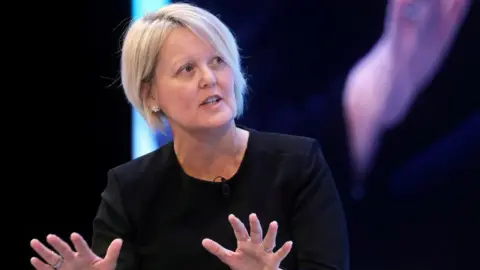Doing business on purpose

 Getty Images
Getty Images- Where most firms aim at profit, with incidental benefits along the way, there is pressure building to change the way business sets out its market stall
- A new report, commissioned by the Scottish government, seeks to point all firms at "purpose" beyond profit, including their responsibilities to customers, society and the environment
- That could bring a competitive advantage, according to public opinion surveys. But making it count by counting it is more difficult
The two most important days in your life are the day you're born, and the day you find out why.
So said Mark Twain, we're told, in an observation that could also be applied to business.
There's a growing movement towards the company being for a purpose - or more precisely, for a variety of purposes beyond the one that has dominated British business.
Making profit is why shareholders tend to subscribe on the day firms are born. And once listed on the London Stock Exchange, the pressure from institutional shareholders is to deliver consistent profit each quarter or a reliable prospect of future dividends.
They're now being asked to consider whether it's in shareholders' long-term interest to aim for other objectives, including the social or environmental.
 Reuters
ReutersA jargon word has emerged - "purpose". Maybe I was late to it, but I first heard it from Alison Rose, chief executive of NatWest, including Royal Bank of Scotland, setting out her leadership mission to make it into a purpose-led bank.
I asked her in an interview last month what that meant. Her reply: "Purpose-led means delivering long-term sustainable value for all our stakeholders - good returns for our shareholders, but also for our customers and for our communities and our colleagues.
"It's about thinking long term and keeping all that in balance, and making sure we're addressing the role we play more broadly than just being a bank - around education, inclusion and the climate, and support for entrepreneurship."
Ms Rose reflected: "From my perspective, as someone who's been in banking a long time, there have been times we haven't balanced all those elements equally."
Those who watched Royal Bank of Scotland going through the Fred Goodwin era and beyond surely cannot argue with that.
Aligned with consumers
A commission was set up by the Scottish government with the Scottish Council for Development and Industry, that broad alliance of the public and private sector, to look into "the purpose of business" and how it might be altered for the public good.
Their results are just in, published in a weighty, glossy report, along with the findings of polling and business surveys.
This suggests that 50% of Scots think the reputation of business is excellent or good, while 5% disagree. The remainder are neutral or don't know.
That's not a bad ratio when one considers the banking crisis or fury at energy suppliers that we've seen in recent years, or those of us holding on the phone while being fobbed off by an automated bot or told for more than two years how "we're experiencing unusually high call volumes". (I digress.)
Nearly two-thirds of Scots questioned for the survey said they would like to see business find profitable solutions to people's problems and those of the planet, while only 27% think that's what they already do.
Nearly half now see the maximising of profit is the current main purpose, and only 17% want to see things remain that way.
 Getty Images
Getty ImagesWhat about consumers? More people say they are influenced by a company's values and beliefs when they buy goods or choose where to work than say that are not. So there may be a competitive advantage there for those who put some effort into this stuff.
A majority want firms to pay the real living wage, but there are only minorities who want firms to pay their fair share of tax (38%), provide job security for employees (32%) or commit clearly to good customer service (30%).
When the Fraser of Allander Institute went to its panel of Scottish firms to find out what they think about it for this commission, it found most want to have a purpose beyond profit, but only by a small majority of 53%.
Many claimed they are already doing their bit, and the spur for that can be from different sources: a board member, employee or customer.
The report gives us examples, from energy giant SSE to Jerba Campervans and from Muckle Media PR to Amiqus software.
Another stimulus is in trying to recruit the best people. Particularly in a hot labour market, and notably with younger workers, the right values and beliefs in the company boardroom, cascading into working life, can make all the difference to winning over recruits and retaining them.
Self-interest
The self-interest extends to aligning with customers' values, and increasingly to investors in search of ethical places to plant their funds.
"A strong business purpose makes clear to customers why they should buy from you, to people why they should work for you and to society why it should trust you," says the report.
The evidence of the survey numbers is good, conclude this commission of people from business, professional services, academia and trade unions. But they also say the effort ought to be scaled up.
So they have set out a vision for every Scottish business to become "purposeful" in delivering not just profit but for people and planet. And going beyond the usual dry analysis, they offer a checklist for company bosses, and also for investors to adopt, and for employees to play a leading role.
The report has 12 suggestions for ways companies, trainers and different layers of government can play their part. Along with some change to company law to help this process, the other ideas tend towards the nebulous and vague.
Number five is to "work with government to inform and mobilise consumer expectation of business purpose".
'Purpose-washing'
By coincidence, this week, the UK government has ventured into this terrain with a suggestion that firms should demonstrate their efforts to cut prices amid the cost of living pressures. For doing so, they could get some kind of government kite-mark. The response has been at best polite explanation of how business works, and sometimes one of withering contempt.
Back in Scotland, the Purpose of Business Commission has set a firmer target of a tenth of Scottish firms, some 36,000, that can define, measure and manage their environmental, social and governance impact.
That's where it can get trickier. Measuring inputs and outcomes of these more abstract concepts is more difficult than bean-counting for the bottom line.
It is also where good intent comes into conflict with cynicism. There is already something known as "purpose-washing". It's the equivalent of green-washing: spray-painting your company's reputation green in the hope of gaining environmental credit.
In this line of business, authenticity counts for a lot.